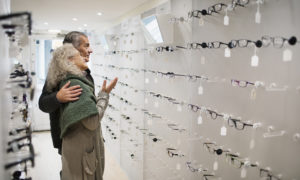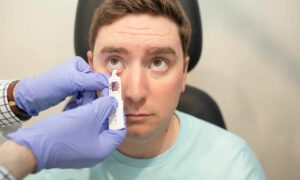Sponsored Content

By Janelle Davison, OD,
Katie Greiner, OD,
and Ansel T. Johnson, OD
The social unrest of 2020 initiated an overdue inspection about how well all professions, including optometry, were doing at ensuring diversity, equity and inclusion (DEI) in the workplace.
With so many questions raised, and new goals needed, it was a relief to find an industry partner, IDOC, there to support efforts to further DEI in the workplace and our communities. With IDOC’s help, our practices are doing more than just talking about DEI. We are finding ways to use those ideals to strengthen our practices’ growth and ability to support our communities. Below are profiles of IDOC board members.
 “Change Starts From Within”
“Change Starts From Within”
Janelle Davison, OD
Brilliant Eyes Vision Center
Smyrna, Ga.
I always knew I wanted to work in healthcare. Originally, I thought I would be a pediatrician, but found mid-college that I wanted to explore other options. On a visit home from Xavier University of Louisiana around 2000, my attention moved to optometry as a potential career. A myope, who had worn glasses since age 12, I went in for an eye exam and found a woman of color as the eye doctor. The doctor explained the great opportunity optometry offered for entrepreneurship and lifestyle flexibility. She also noted the exciting scope of practice expansion that was in high gear at the time.
When I went back to school, I visited the college’s pre-med center, and began laying the groundwork for a career in optometry. I started by shadowing an eye doctor, another woman of color, who demonstrated great work-life balance and fulfillment. In addition to being a successful practice owner, she was building a family. She was married and expecting twins.
After those two experiences with optometrists, who both happened to be women of color, I didn’t realize how few Black optometrists there were, and that we only comprised 3 percent of the profession, even though 13 percent of the U.S. population identifies as Black. When I began going to industry conferences, I was sometimes asked what the lunch menu was by other attendees, who assumed I was the hired help. When vendors met me, after I became a practice owner, they sometimes would ask who the owner of the practice was, assuming, as a Black woman, that it most likely was not me.
Fortunately, as I continued building my independent practice, I found IDOC, an essential industry partner, had made DEI a priority. The organization’s “Why” is empowering independent owners to live the practice of their dreams. Part of the mission now is ensuring that dream is open to everyone. That meant first acknowledging the importance of DEI and making it a priority. Believing that change starts from within, IDOC has implemented cultural bias training for its own employees, started a relationship with Diversity Perspective and are strategizing how to encourage more Black and all diverse individuals to enter optometry.
That awareness of the importance of DEI, and the need for us all to acknowledge our own biases, and work to do better, is coupled with strong support of opportunities for new practice owners. In my own cold-start practice, I have made great use of IDOC Select, which provides human resources support, including ready-to-go templates for employee manuals, along with business analytical tools from GPN EDGEPro. This allows me to see at a glance everyday how my practice is doing compared to other similar practices. This gives me the ability to set meaningful growth goals.
The vendor discounts IDOC provides, along with the networking opportunities with other optometrists and vendors, helps me prime my practice for growth. IDOC aligns with my career goals, and I am thrilled to be a board member and part of IDOC’s growth strategy.

“Let’s Talk About It, Bring It Up & Make Sure People Know We’re Aware of It”
Katie Greiner, OD
Northeast Ohio Eye Surgeons
I became interested in optometry when I got contact lenses for the first time when I was around 10. The optometrist was a petite woman—a powerful little thing—who reminded me of myself. She showed me I could be little and powerful and leave a lasting impression on people.
After optometry school, I did a residency in surgical co-management, focusing on providing pre- and post-operative care for LASIK, cataract and glaucoma patients. After working at a LASIK surgery center and a private practice surgeon’s office in Columbus, I moved back to my hometown in Northeast Ohio, and joined Northeast Ohio Eye Surgeons, where I am now the CEO overseeing operations in six eyecare offices and a surgery center, as well as a practicing OD.
As a mother of two young children, it’s so important to better understand how I can impact diversity in the workplace and have an awareness of my own biases. I have found these concepts to be second nature to my children in preschool. I wanted to bring that same sensibility about DEI to our employees. After the death of George Floyd, when questions were asked everywhere about DEI, we met with our employees to discuss their feelings, and ask how we were doing as a company. I didn’t want our employees to feel we were sweeping these questions under the rug.
We asked our employees to share their own stories. One member of our team, who is biracial, shared how he feels the discomfort he arouses in society when he wears a hoodie with his hands in his pockets. He says he feels the need to say hello and introduce himself when he goes into a 7-Eleven at night to avoid the store owner becoming frightened that he’s there to commit a robbery.
In our own office, we let employees know that we will release from the practice any patient who has treated them with disrespect, including treating them in a discriminatory way, such as by using racial slurs, or making them feel they were treated differently in any way due to their race, religion or gender. They are to get a director immediately, so we can act quickly in these situations. We have followed through on this commitment, firing a few of our long-time patients.
In addition, we revised our employee manual, to allow for greater individuality and self-expression. For example, we used to be strict about employee hair color conforming to natural-looking palettes. Now, if an employee wants to wear blue hair, and feels it is part of who they are, we are happy to let them do that. We want to let our employees know we don’t expect them to hide their identity to work for us.
I am gratified to see that IDOC takes DEI as seriously as my practice does. We had a devoted IDOC board meeting in which we brainstormed for over an hour about how we can further DEI goals. (This is also leaning into a tenet of the CEO Action Pledge IDOC signed on to www.ceoaction.com). That includes, for instance, creating greater volunteering opportunities in under-served communities, many of which are communities of color, and partnering with groups whose mission is to grow diversity in optometry. The IDOC board helped develop multiple plans which are currently under review, as we continue refining how we will help our profession become more reflective of the U.S. population, and how we will use that diversity to better serve patients.
The great thing about IDOC is, as impressive as the vendor rebates are, it’s about more than cost savings. It’s about how the organization can best help its members. I go to board meetings and hear about dues for two seconds and the rest is about members and what IDOC can do for members to make them more successful. IDOC’s strengthened commitment to DEI is just one of many ways the organization is helping us improve both our practices and the optometric community.
 “Opportunity to Build a Practice & Be Inspirational for Others to Follow”
“Opportunity to Build a Practice & Be Inspirational for Others to Follow”
Ansel T. Johnson, OD
Vision Salon Eye Care Associates
Blue Island, Ill.
I became an optometrist because, number one, it was a profession much more involved in primary healthcare than I initially thought. Secondly, optometry offered the opportunity to not only be a doctor, but to own my own practice and be an integral part of the community. Third, there were, and still are, few African American optometrists.
When I started out in optometry, it was estimated that there were only about 400 African American optometrists in the U.S. There is a need for eyecare in every community, especially in communities of color, for various reasons. I looked at our low numbers in our community as an opportunity to build a practice, and be inspirational for others to follow, as I was inspired. Our numbers by percentage have not grown since then, so I still seek to make an impact. In addition, optometry is an alternative and lucrative path to doctorhood not often thought of for young African Americans.
Other Articles to Explore
I started my college career pre-med, but I had a classmate, now my colleague, who was pre-optometry. He showed me there was a path that might be better for me. I liked the work-life balance optometry offered and the quality of life. I also liked working with complex medical eyecare instrumentation on a day-to-day basis. My classmate told me about a large established African American-owned optometric practice, Plano Child Development in Chicago. I visited and saw the type of work they did, and I was hooked to the profession and the daily impact optometrists can make in the community.
My first full-time job once licensed was with a national corporate chain where I practiced for 4.5 years, always with the goal of opening my own practice. I found I was losing some of the high-level clinical skills from my training due to the practice environment I was in. Routine care dominated my day-to-day patient care, and my professional growth was limited. I had always been inspired and motivated to go into private practice. After four years it was time.
After looking at locations for several months, I approached an older OD who practiced in the town where I went to high school. It was primarily a public aid practice, and I proposed merging into the practice part time, not taking pay from him, but paying him a sublet fee and building my own patient base. He got sick before moving forward, and his wife sold me the practice. Over time I broadened the patient base and grew the practice’s medical eyecare services while adding a higher-quality optical boutique.
To me, diversity, equity and inclusion in the eyecare profession means that at all levels, from sales reps, corporate management and c-suite, optometry school student body, administration, boards of trustees, AOA leadership, and beyond, the profession looks like the U.S. population. Equity would mean that on all these levels Blacks and other professionals of color would have real power and influence.
IDOC is sending the industry the message that its leadership is committed to DEI. I have seen first-hand that its executives are serious about DEI. They frequently seek my input and advice, based on my own experiences. Internally they are walking the DEI walk with a diverse group of highly talented new hires.
Along with its commitment to DEI, IDOC is a great support to anyone who is new to private practice. Its vendor discounts provide critical help in keeping a practice’s cost of goods low. IDOC consulting and its HR services are important in avoiding the common mistakes new practices make. In addition, the organization has been a great help to my practice in guiding us in staffing and marketing. IDOC Social Media has significantly strengthened the growth our patient base. I get the support I need to make my practice the success it needs to be, both for myself and my community.
Janelle Davison, OD, is the owner of Brilliant Eyes Vision Center in Smyrna, Ga. To contact her: dr.davison@brillianteyesvisioncenter.com
Katie Greiner, OD, is the CEO of Northeast Ohio Eye Surgeons. Click HERE to learn more about Dr. Greiner. To contact her: kgreiner@neohioeye.com
Ansel T. Johnson, OD, is the owner of Vision Salon Eye Care Associates in Blue Island, Ill. To contact him: eyedrj@visionsalon.com

























